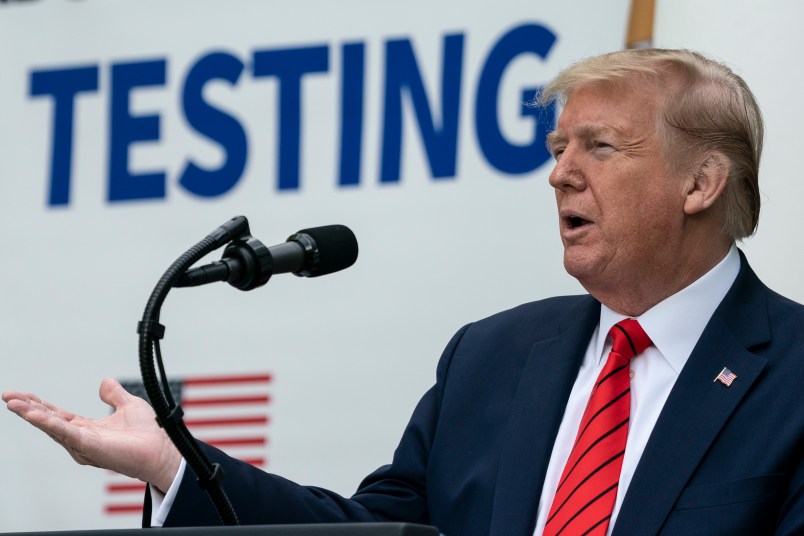People living in communities hit hard by COVID-19 want federal support for free, drive-through testing sites in their communities to continue.
The Trump administration is letting support for 13 testing sites around the country lapse on June 30, meaning that the federal government will stop supplying testing kits, staff, and contracts for laboratories and patient notification of results across five states at the end of this month.
After TPM broke the story on Tuesday, Department of Health and Human Services Assistant Secretary Brett Giroir issued a statement saying that the government was not ending “funding or support” for COVID-19 testing sites, but that it was instead focusing on a separate program supporting testing at pharmacies and federally qualified health centers.
“The only truthful, but still misleading report in the media, is that we are transitioning 13 sites from the original now antiquated program to the more efficient and effective testing sites outlined above,” Giroir said, adding that governors from the five affected states had “agreed that it was the appropriate time to transition out of the original 13 sites and into the thousands of new testing options.”
At the same time as Giroir calls the testing sites “antiquated” and praises the “new testing options,” local officials and representatives for some of the testing locations have been begging his department to keep supporting the sites.
Take the example of Texas.
COVID-19 is battering the state with abandon, with the state recording its fastest-yet rate of increase in cases. Governor Greg Abbott (R-TX) advised citizens to stay at home on Wednesday, while stopping short of issuing a formal order that would require citizens to do so.
Houston has been especially hard hit, with some hospitals in the city seeing as much as 47 percent more COVID-19 patients than they did a week ago.
Dr. Umair Shah, head of public health for Harris County, where Houston is located, sent a letter to HHS and FEMA on June 20 asking them to extend federal support for sites in the city.
We need to do everything we can to continue #COVID19 #testing – we do not need less testing which is what @FEMA’s departure would mean, we need instead more esp as #HarrisCounty #Houston see increases in cases/hospitalizations @NACCHOalerts @hcphtx @TexasDSHS @ReadyHarris @texmed https://t.co/ttpBSasaRE
— Dr. Umair A. Shah (MD, MPH) (@ushahmd) June 24, 2020
Dr. Shah was joined in his demand by City of Houston Public Health Authority Dr. David Persse, who sent a separate letter to HHS on the same day asking for an extension for federal support for the sites.
Four members of Congress representing parts of Houston and its suburbs sent a letter to the Trump administration on Tuesday evening also demanding that the sites remain open.
The demand for continued support for the sites appears to exist outside of the hotspot state of Texas.
In relatively mildly hit Colorado, for example, the federal government has continued to support a testing site in Pueblo County.
Randy Evetts, public health director for the Pueblo Department of Public Health and Environment, said on a press call on Tuesday that he expected his state department of health would step in to keep the site open.
“We’ve been requesting it since end of May, first part of June, and we have been told that we have been able to extend it,” Evetts said. “It’s coordinated very closely with our state emergency management department, and so I’m not completely clear if it’s going to remain an HHS site or if it’s going to be a state site.”
Pueblo’s site tests 250 people a day. For Evetts, that’s a significant help.
“We’re looking at trying to expand our testing so that we have the capacity and capability to reach out to vulnerable populations that cant get access,” he added.
In Pennsylvania, the feds have continued to support a site that was nearly closed in April. But that one — in Montgomery county — would also lose support at the end of this month.
A spokesperson for Rep. Madeleine Dean (D-PA) told TPM that her office “is reaching out to our Governor’s office to discuss this and lobby the federal government to keep this necessary community-based testing sites in place.”
“Rep. Dean is especially concerned about this plan considering Dr. Fauci’s testimony yesterday and the nationwide upward trend of Coronavirus cases,” the spokesperson added.










